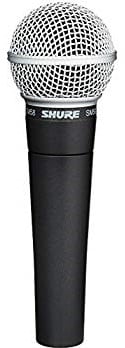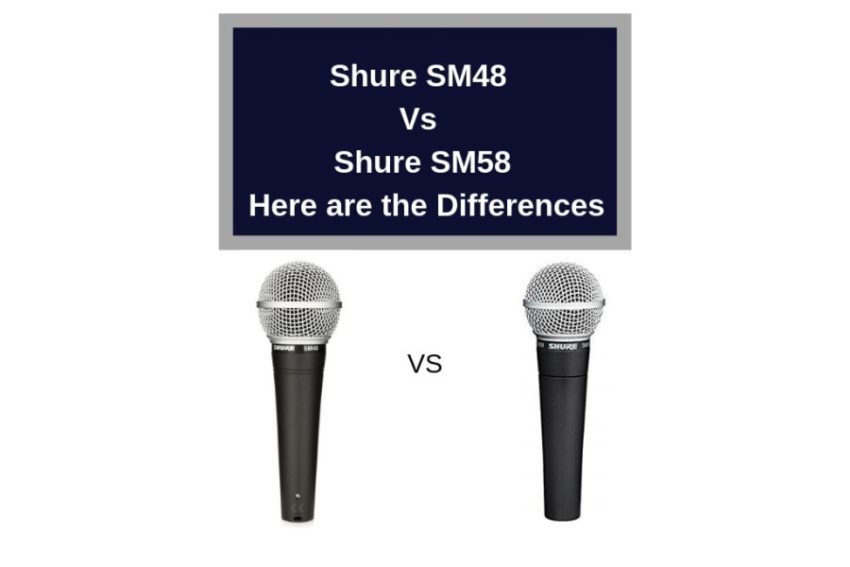Last updated on December 30th, 2023 at 02:54 pm
Both of these microphones are extremely popular, the SM58 is probably the most famous microphone of all time, and for good reason.
Both of them are really affordable microphones, but with the SM48 being about 50% cheaper or sometimes even more, this begs the question; Which one is the better choice?
Shure SM48 vs Shure SM58
The SM58 has an overall brighter-, clearer- and fuller sound, with a more present mid-range, allowing it to cut better through the mix, making it the better choice for lead vocals.
The SM48 doesn’t cut as well through the mix and it requires slightly more gain to reach the same sound level as the SM58, making it a better choice for backing vocals.
Let’s first do an overview of both microphones, so you can really decide which one you should get.
Shure SM48

The Shure SM48 is an incredibly affordable microphone.
It is a lot cheaper than any microphone of that caliber.
You can get one with an On/Off switch which will cost you a bit more, but still, price won’t be an issue.
It is a great alternative to the SM58, especially considering that it’s much more affordable while sounding very similar.
This Microphone has a built-in pop-filter, but you will need to use an external one if you want to avoid plosives.
If you are on a very tight budget, then this one would be your best bet.
The build quality of the SM48 is extremely good, you could drop it a hundred times and it would still work perfectly.
The sound quality is very good, it sounds clear and crisp, not as good as the SM58, but the differences are hardly noticeable, in a live setting you really will not be able to tell the difference.
It comes with a bass roll-off which helps control the proximity effect, plus a mid-boost which helps the vocals cut through the mix, just not as much as the SM58.
This mic provides good feedback- and handling noise rejection. It’s also good at rejecting off-axis sound.
The SM48 is a fantastic choice for karaoke, band practice and backup vocals, especially if you have a couple of backup singers and you’re on a tight budget.
What you get in the Box
- The Shure SM48 Microphone
- Microphone Stand Clip
- Carrying Pouch
Features
- Cardioid pickup pattern rejects off-axis sound and feedback
- Brightened mid-range and bass rolloff.
- Shock-mounted cartridge for reduced handling noise
- Built-in pop-filter, which works quite well, still you should use an external one
- Great build quality and ruggedness
Specifications
| Polar Pattern | Cardioid |
| Microphone type | Dynamic |
| Frequency Response | 55 to 14,000 Hz |
| Output Impedance | Rated impedance is 150 Ohms (300 Ohms actual) |
| Connector | Three-pin (XLR), male |
Purchasing a microphone on a budget can be tough since you don’t know if what you are getting is good or simply junk.
Luckily, the SM48 is a great and very affordable microphone. Plus, if you end up not liking it you didn’t really waste any money since it’s so cheap.
Find out more about the Shure SM48 here:
Shure SM48: Amazon, Sweetwater.
Shure SM58

The Shure SM58 is the go-to microphone in the recording industry, from live performances to studio recordings, and since it costs much less than any other microphone of this quality, there is no way you could ever go wrong when purchasing one.
Even great artists like Elton John use this microphone, which means that it must be extremely good.
This Microphone has a built-in pop-filter that is quite effective, not perfect though.
In most cases, I would recommend using an external pop-filter to really avoid the plosions.
Just like the SM48, it has a steel mesh grille which ensures that even with rough handling, the SM58 will perform consistently and will also be able to out-live some of those times that you accidentally drop it on the ground.
Just like the SM48, this microphone has a built-in shock mount, to cut down on handling noise, and is built like an absolute tank, so it’s great for live performances and to take it on the road.
It has a mid-boost and bass roll-off, which will help the vocals cut through the mix.
What you get in the Box
- Shure SM58 Microphone
- Microphone Stand Clip
- Carrying Pouch
Features
- Rugged and durable metal body
- Great feedback rejection
- High sound pressure handling capability
- Shock-mounted capsule provides excellent suppression of handling noise
- Uniform on- and off-axis response (better than the SM48 in my opinion)
- Cardioid pick-up pattern provides isolation from other on-stage signals
Specifications
| Polar Pattern | Cardioid |
| Microphone type | Dynamic |
| Frequency Response | 50 to 15,000 Hz |
| Output Impedance | Rated impedance is 150 Ohms (300 Ohms actual) |
| Connector | Three-pin (XLR), male |
| Sensitivity | -57.5dB |
As I stated earlier, the SM48 needs more gain to generate the same volume than the SM58, this however should be an issue since most Audio Interfaces and Mixers are capable of powering it properly.
In my opinion, the SM48 needs a bit more work to make it sound good. You need to apply some EQ, compression, etc. With the SM58 you also need to do this but not as much or as often.
Find out more about the Shure SM58 here:
- Shure SM58: Amazon, Sweetwater.
How to get the most out of these Microphones?
Since both of them are dynamic microphones with a cardioid pattern, you don’t really need that much to make them sound pleasing.
First, you will need an Audio Interface if you plan on recording at home, or a mixer if your goal is to do live shows.
There are affordable Audio Interfaces that are great for a home recording studio, especially if you are a beginner.
Mixers come in a variety of shapes and sizes, some of them are mixers with USB multitrack recording capabilities, which means that they can record multiple simultaneous tracks onto your DAW, these can still be used for live performances, but they are quite expensive.
The mixers used for live performances allow you to record only a stereo track on to your DAW, the tradeoff is affordability.
Sound treatment is also a contributing factor since whenever you record, the better the room sounds then the better the recording overall.
However, as I explained earlier, if there’s one kind of microphone that is very forgiving in this regard, it’s the dynamic microphone.
Differences
- The first and most important one is that the SM58 cuts better through the mix thanks to its cleaner and more present mid-range.
- Both have a fairly similar frequency response with some small differences; 50Hz-15kHz for the SM58, and 55Hz-14kHz for the SM48.
- The SM48 needs a bit more gain to reach the same volume.
- As I mentioned earlier, the SM48 needs a bit more processing to sound good, you will need to adjust the EQ and compression settings nearly every time.
- Finally, the SM48 is much more affordable, making it ideal for people on a tight budget.
Conclusion
If we take the price into account, even though the SM58 isn’t really an expensive microphone, the SM48 would provide the best value.
The sound quality is very similar for both microphones, but the SM48 costs half or even a third at times, of what SM58 does.
If you’re planning on purchasing a microphone for background vocals, karaoke or band practice then absolutely go for the SM48.
However, the SM58 is a better microphone, which can also be used for all those purposes plus for recording in a studio.
If I had to choose, I’d go with the SM58, it’s that big of a price difference and it will last you a lifetime.

Thank you for the thorough review. I would love to know more about how the SM48 performs in a live situation. Also, what is the model number of the SM48 with an on/off switch?
This post has really made me interested in the SM48. Thanks a lot 🙂
Excellent and to the point.